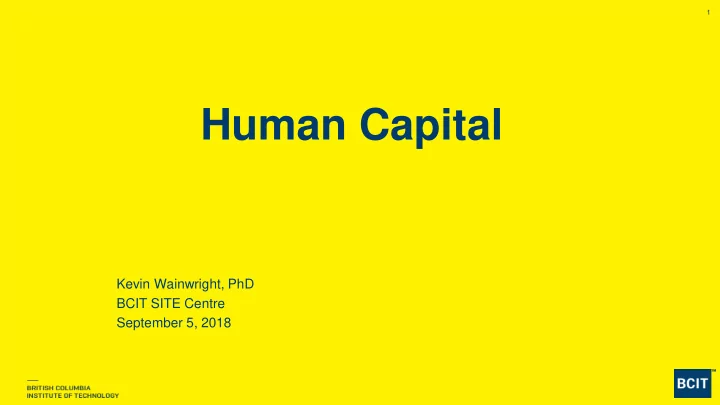

1 Human Capital Kevin Wainwright, PhD BCIT SITE Centre September 5, 2018
2 Human Capital • Skills • Training • Experience • Innate ability
3 Productivity Labour productivity: output per worker Capital Labour Ratio Physical Capital Technology Human Capital Canada vs Other Countries
4 Current Issues Demographics AI and Robotics Immigration, Diversity and Workplace Culture Skills gap Investment in Training Public Sector (Post-Secondary Institutes) Private Sector (in-house, on-the-job)
5 Demographics BC's Working Age Population 70 to 74 65 to 69 60 to 64 55 to 59 50 to 54 45 to 49 Age Group 40 to 44 35 to 39 30 to 34 25 to 29 20 to 24 15 to 19 150,000 200,000 250,000 300,000 350,000 400,000 Population Source: BC Stats, Population by age and Sex, Provinces, Territories and Canada
6 AI and Robotics
7 Employers are Looking for…
8 Employer Ranked Skills 1. Ability to work in a team structure 2. Ability to verbally communicate with persons inside and outside the organization 3. Ability to make decisions and solve problems 4. Ability to obtain and process information 5. Ability to analyze quantitative data 6. Ability to plan, organize, and prioritize work 7. Technical knowledge related to the job 8. Proficiency with computer software programs 9. Ability to create and/or edit written reports 10. Ability to influence others
9 Labour Market Supply
10 Immigration & Foreign Credentials • Over 340,000 people in Canada possess unrecognized foreign credentials • Most employers lack confidence in foreign credentials • The foreign credential assessment process has limitations
11 Effe fect ct of N Non-Reco ecogn gnit itio ion n of Fore reign gn Cre redenti tial als • Foreigners are competing against those with lower level credentials • Effect: under utilized skills and foregone employment opportunities • Unrecognized learners are less likely to continue to develop themselves • Effect: Canada will have lower levels of human capital in the long run
12 Op Oppo port rtun unities es Large population with both traditional (formal) and non-traditional (or informal) training. Recognition of non-traditional training and foreign credentials creates opportunities : Engagement, continuing education Lower cost of education Increased income opportunities “ Canadianization ” of non -Canadians
13 Human Capital Development and Prior Learning Assessment
14 Block Outcomes - APPL Approach
15 Moving Forward More shorter, modular credentials Greater recognition for experience and informal training A more robust approach to Foreign Credentials Greater investment in on-the-job training, internships, practicums
16
Recommend
More recommend